Paul Bishop's Blog, page 76
February 12, 2013
FIGHT CARD: AGAINST THE ROPES!
 FIGHT CARD: AGAINST THE ROPES!
FIGHT CARD: AGAINST THE ROPES!FIGHT CARD AUTHOR TERRENCE MCCAULEY (WRITING AS JACK TUNNEY) WEIGHS IN ON
I love boxing. Always have – warts and all.
I can't explain why I love it, exactly. It's not that I ever had any talent for the sport. Oh, I’ve taken and thrown a few punches in my time, but that’s not boxing. I lack a depth of vision that always made sports difficult for me. I could never shag a fly ball properly or gauge the distance between me and a football. And I can't really tell how far away a fist - gloved or not - might be from my face, which made my ability to take a punch come in mighty handy over the years. I was never what you might call a roughneck, but in the course of my life, I had my share of scrapes.
How many?
Let’s just say I’ve had enough scrapes to appreciate the skill and commitment it takes to climb into a ring and duke it out over twelve three-minute rounds against another trained professional. To dedicate endless hours to training and pushing yourself to the limit knowing that you're ultimately going to get hit. And, despite all that, you still step between the ropes anyway.
MMA has its merits, don't get me wrong. It’s faster than boxing, often more brutal and tends to have more blood. It usually makes for great television. But I think boxing has an added gallantry to it that I think MMA lacks.
In boxing, you can’t use your legs or elbows. Head butts are illegal, and so are takedowns. In the ring, unlike the cage, all you have is your fists, your skill and your will against your opponent. I admire that kind of courage. And in today’s mixed up world, I admire that kind of clarity.
Why did I write FIGHT CARD: AGAINST THE ROPES? The short answer is because Paul Bishop let me. I’ve been a fan of the Fight Card series from the beginning and had wanted to try my hand at writing for the series. I'd already covered Terry Quinn's boxing career in passing in my other book PROHIBITION, which was written several years before the Fight Card series began. But since Quinn’s days in the ring play such an important role in which the character has become at the beginning of PROHIBITION, I’d always dreamed of being able to tell the story of the end of his career in more detail.
When Airship 27 gave PROHIBITONthe green light for publication, I thought Fight Card would be the perfect vehicle to tell Quinn’s story. And, much to my surprise and delight, Paul agreed. The result is FIGHT CARD: AGAINST THE ROPES.
But what makes the Terry Quinn character so special in the first place? Why devote one book to him, much less two (not to mention all the short stories I’ve written about him)? He’s an ex-heavyweight contender who becomes an enforcer for the mob in 1920s New York. Hardly an original idea. Half of the henchmen in pulpdom and noirdom have boxing backgrounds, if not more.
While that’s certainly true, I worked hard to make sure Quinn was different than those other characters. Enforcers of pulp fiction are usually portrayed as brutes, guys who were too quick with their fists and too slow with their brains. They’re usually easy pickings for the hero of the story. Or they’re punch-drunk has-beens past their prime and looking for some kind of redemption. One last shot at glory.
In Quinn, I wanted to create a different kind of character who was certainly recognizable, but had more going for him than the reader might expect. Sure, he’s a big, tough, mean, violent guy. That’s what makes him interesting to the reader. But Quinn also has something he doesn’t value very highly: a brain. He thinks of himself as just a pug while everyone around him sees him as much more than that.
I wanted to create a character who didn’t fit the traditional mold of a thug; one who was tough but not cocky. Who followed orders, but wasn’t ambitious. Who was loyal and had his loyalty reciprocated by Archie Doyle, the man who runs the criminal empire of PROHIBITION and plays a huge role in FIGHT CARD: AGAINST THE ROPES as well.
I could’ve written Quinn differently. I could’ve made him a war veteran or an ex-cop or just another product of the mean streets of New York City. I made Quinn a boxer because boxers have a capable, professional toughness that writers like, but rarely capture accurately. I wanted a tough guy an audience would be surprised they were cheering for.
I wanted a character who wouldn’t give me the luxury of the easy plot devices some crime novelists have employed in their stories. You know: the one where the hero walks into a room, gets hit over the head and wakes up tied to a chair. Quinn’s not the kind of character who’s going to let anyone get that close to him. He doesn’t make those kinds of mistakes. He sizes up every situation at his own pace, decides on a course of action and sees it though. He’s not afraid because he’s learned not to be.
Is he a hero? I don’t know. He’s a protagonist, that’s for sure. Is he a good guy? That’s for you to decide. Is he a bad guy? He’s done bad things and even the worst thing: murder. But does that make him a villain? You tell me.
Quinn is a character that I know the audience might not admire, but he’s a character who I certainly hope you’ll want to read about. He does bad things for mostly the right reasons, even when those reasons are criminal reasons. He’s black and white in a Technicolor world. He views the world with narrow parameters and lives his life accordingly.
To Quinn, life outside the boxing ring isn’t much different than life in general. He honed his skills through training and sacrifice. He adapted those skills for each specific opponent he faced. He climbed between the ropes and took whatever they threw at him. And he hit back.
Just like all of us do in our own lives. Every single day.
FIGHT CARD: AGAINST THE ROPES
New York City - 1925
The boxing ring was the only world Terry Quinn had ever known. He'd entered the hallowed halls of St. Vincent’s Home for Boys in New York City as a fighter and left as a boxer. Years of training and honing his skills finally paid off as he fought his way to the top. Only one more fight stood between Quinn and shot at the heavyweight championship against Jack Dempsey. It was the glory he'd been waiting for all his life.
But things have never gone easy for Terry Quinn. As he starts training for the biggest fight of his career, a crew of Tammany thugs and fix-it men tell him to throw the fight or face dire consequences. Even before he has a chance to consider their offer, those dire consequences come home to roost when one of his long time corner men turns up dead.
The identity of the killer isn't in question. The only question is what is Terry Quinn going to do about it.
Against The Ropes is a tough New York tale played out while the Roaring Twenties roared their loudest. Crooked cops, Tammany hacks, has-beens, and even the great Jack Johnson, all play a role in Quinn’s decision – is his quest for justice worth his future, and possibly ... his life.
Published on February 12, 2013 23:37
AVAILABLE NOW: FIGHT CARD: AGAINST THE ROPES
 AVAILABLE NOW ~ FIGHT CARD: AGAINST THE ROPES
AVAILABLE NOW ~ FIGHT CARD: AGAINST THE ROPESThe February 2013 Fight Card release, Fight Card: Against The Ropes, comes from acclaimed New Pulp author Terrence P. McCauley (writing as Jack Tunney).
In December, Terrence saw his novel Prohibition – featuring Terry Quinn, ex-boxer turned mob enforcer in 1920’s New York – released from top pulp publisher Airship 27. Prior to the release of Prohibition, Terrence pitched the prequel – telling the tale of Terry Quinn’s boxing years – as a Fight Card novel. While the 1920’s was new ground for Fight Card, the character and writing was so strong, it was immediately a done deal. Fight Card: Against The Ropes is the result.
FIGHT CARD: AGAINST THE ROPES
New York City - 1925
The boxing ring was the only world Terry Quinn had ever known. He'd entered the hallowed halls of St. Vincent’s Home for Boys in New York City as a fighter and left as a boxer. Years of training and honing his skills finally paid off as he fought his way to the top. Only one more fight stood between Quinn and shot at the heavyweight championship against Jack Dempsey. It was the glory he'd been waiting for all his life.
But things have never gone easy for Terry Quinn. As he starts training for the biggest fight of his career, a crew of Tammany thugs and fix-it men tell him to throw the fight or face dire consequences. Even before he has a chance to consider their offer, those dire consequences come home to roost when one of his long time corner men turns up dead.
The identity of the killer isn't in question. The only question is what is Terry Quinn going to do about it.
Against The Ropes is a tough New York tale played out while the Roaring Twenties roared their loudest. Crooked cops, Tammany hacks, has-beens, and even the great Jack Johnson, all play a role in Quinn’s decision – is his quest for justice worth his future, and possibly ... his life.
Published on February 12, 2013 23:13
FIGHT CARD: RUMBLE IN THE JUNGLE!
 FIGHT CARD: RUMBLE IN THE JUNGLE!
FIGHT CARD: RUMBLE IN THE JUNGLE!FIGHT CARD AUTHOR DAVID FOSTER (WRITING AS JACK TUNNEY) GIVES US THE LOWDOWN ON FIGHT CARD’S JANUARY 2013 RELEASE, FIGHT CARD RUMBLE IN THE JUNGLE ...
The Fight Cardbooks are a blast to write, so when I finished up my first entry in the series, King of the Outback, I immediately knew I wanted to write another. However, I thought I had gone as far as I could with the characters in that story. That is to say, I couldn't write a direct sequel. So, I had to look for a new tale to tell.
My first thoughts drifted toward a tale set in the seedy American underworld. But other writers in the Fight Card series – such as Eric Beetner and Heath Lowrance – had already written fantastic books showcasing boxing, intermingled with the American underworld. I knew I couldn't walk down that path, or if I did, all I would be doing was writing a limp pastiche of what had gone before.
So, to move forward, I knew I had to look for other ideas and settings. The first flash of inspiration came on the train to work. I happened to be listening to an audio book of Ian Fleming's Moonraker, and a passage described how James Bond looked to casual observers. Here's the passage.
And what could the casual observer think of him, 'Commander James Bond, CMG, RNVSR', also 'something at the Ministry of Defence', the rather saturnine young man in his middle thirties sitting opposite the Admiral? Something a bit cold and dangerous in that face. Looks pretty fit. May have been attached to Templer in Malaya. Or Nairobi. Mau Mau work. Tough looking customer. Doesn't look the sort of chap one usually sees in Blades. – Moonraker, Ian Fleming (1956) – Page 28 of the Pan paperback (24th printing, 1969)
Mau Mau work. The idea of setting the story during the Mau Mau rebellion in Kenya peaked my interest. It suited the time frame perfectly, as the Fight Card books are almost all set in the 1950s. And on the surface, the Mau Mau seemed like a ready-made villain. I thought it would be great to drop a boxer, smack dab into the middle of that conflict.
However, the conflict was far too complex and multi-faceted to provide an entertaining framework to build a story around. At least, without spending many thousands of words on lengthy explanations of the conflict – certainly not suitable for a 25,000 word novelette. Also, history has changed the perception of the Mau Mau conflict greatly. What was once considered a violent rebellion is now considered a turning point to Kenyan democratic freedom. So unlike in Fleming's time, the Mau Mau are now the good guys.
Instead, I created the fictitious country of Sezanda, and the villains are not so much the Sezanda Socialist Army (standing in for the Mau Mau), but a group of neo-Nazis who are behind a similar style of rebellion.
I was sad to see the Mau Mau go, but if I continued with the style of story I wanted to write, I would have appeared as a blinkered, ignorant, racist – which was certainly not my intention. I simply wanted a conflict as background, to drop my protagonists into. But that's the thing with any conflict I guess, there is always two sides.
So, I had a setting. Now I needed a hero.
In King of the Outback, Tommy King is a ready-made hero. Right from the get-go, he has the tools (his fists) and attitude to fight for what's right. In some ways he is a superman, albeit one who bleeds – a lot! This time I wanted the main protagonist to be somewhat more of a reluctant hero.
As it happened, I was watching an old Chuck Norris film, A Force of One (please don't hold that against me). What struck me, was how much more enjoyable it was than many of Chuck's later offerings, in which he would play pretty much a superman. In A Force of One, Chuck, despite his formidable skills, refuses to be drawn into the local police's attempts to track down a karate killer. Chuck does not want to get involved. But of course, after the bad guys mess with Chuck's family (bad move), he does become involved, and when that happens there is a palpable frisson. It is a Hell Yeah!moment. We know Chuck didn't start the fight, but he is damn well going to finish it.
In Rumble in the Jungle, I wanted to use a similar style protagonist. A man who does not want to fight, but has no other option. In the story, that man is Brendan O'Toole, a man who has lost everything and wants to be left alone. But as civil war breaks out in Africa, O'Toole is left with very little choice but to fight.
I am proud of Rumble in the Jungle. I think it serves up the kind of characters and pugilistic action fans of the Fight Card series have come to expect. It contains more action than two full length novels, and hits harder than a Mack truck. But it also brings something new to the series. It is a story of love, loss, redemption and ultimately standing up to tyranny and oppression. I hope you enjoy it.
FIGHT CARD: RUMBLE IN THE JUNGLE
Hell’s Kitchen, 1953
Brendan O’Toole is on a downward slide. When his wife dies in a freak car accident, he quits his job and hits the bottle hard. Half tanked in the ring, he allows himself to be knocked out, ending his boxing career.
O’Toole, hits rock bottom. After a night of boozing, he is brutally mugged and left for dead. But O’Toole has friends, even if he can’t see it. One of them is Danny Reilly, a barman with a heart of gold. He arranges for O’Toole to join a construction crew set to work on a hotel being built in the Central African jungle nation of Sezanda. It’s O’Toole’s last shot at redemption.
Sezanda, Central Africa, 1954
As things begin to look up for O’Toole, the Sezandan government is overthrown in a military coup. All foreigners are taken prisoner and locked in concentration camps. O’Toole is sent to the worst, HELL CAMP XXI, under the control of a brutal ex-Nazi, Kommandant Krieger. Krieger has a special way of keeping his prisoners under control. In the camp, he has erected a boxing ring. And anyone who steps out of line is forced to face off against his man-mountain, wrecking machine, Crator – a man whose sole purpose is to inflict pain.
Fate has destined Brendan O’Toole to don the gloves one more time, in a fight not just for his life, but his very soul.
Published on February 12, 2013 23:07
February 11, 2013
HARBOILED COLLECTIVE: FEATURED AUTHOR CHRIS KNOPF!
 HARBOILED COLLECTIVE: FEATURED AUTHOR CHRIS KNOPF!
HARBOILED COLLECTIVE: FEATURED AUTHOR CHRIS KNOPF!Chris Knopf writes elegant, intelligent, thrillers that actually thrill. His latest book Dead Anyway is the perfect place to start reading if you haven’t yet been introduced to Chris’ work. It’s a pleasure to feature him on Bish’s Beat and present the first chapter of Dead Anyway ...
Chris is the author of ten books, including two series set in the Hamptons, one starring Sam Acquillo (Black Swan, 2011) and a spin-off featuring Sam’s lawyer, Jackie Swaitkowski, including Ice Cap, released June, 2012.
The first in a new mystery thriller series, Dead Anyway, launched in September 2012, received starred reviews from PW, Booklist, Kirkus and Library Journal. It was also Book of the Day in Kirkus and has been reviewed on two major NPR affiliates.
Visit Chris'd website: www.chrisknopfmystery.com
DEAD ANYWAY
Imagine this: You have a nice life. You love your beautiful, successful wife. You’re an easy going guy working out of your comfortable Connecticut home. The world is an interesting, pleasant place.
Then in seconds, it’s all gone.
You’re still alive, but the world thinks you’re dead. And now you have to decide. Make it official, or go after the evil that took it all away from you.
Arthur Cathcart, market researcher and occasional finder of missing persons, decides to live on and fight, by doing what he knows best – figuring things out, without revealing his status as a living, breathing human being. Much easier said than done in the post-9/11 world, where everything about yourself and all the tools you need to live a modern life are an open book. How do you become a different person, how do you finance an elaborate scheme without revealing yourself? How do you force a reckoning with the worst people on earth, as a dead man?
"An absorbing update of the classic film, D.O.A., that finds its author so completely in the zone that not a word is wasted, and the story seems to unfold itself without human assistance." --Kirkus, starred review
DEAD ANYWAY
CHRIS KNOPFCHAPTER 1I remember Florencia dressing that morning. I was still in bed, propped up on the pillows, ostensibly reading a book. Moments earlier we were as intimate as two people could be, utterly entangled in mind, body and soul. Though even then, as I watched her brush out her hair and slither into her pantyhose, I knew she was a separate person, already engaged in the coming day, where she would live apart from me, as her full self, focused and absorbed in her work. I would have plenty to absorb me as well, but never drifting far from that bedroom, and that instant in time. Physically, I’d be one floor below, in the den, at the oaken desk Florencia had given me for Christmas. My mind, at the behest of my clients, would be traversing the earth in search of hidden information – that part of my mind that wasn’t lingering with recollections of the morning, the smells and feel of skin-on-skin, the transcendent lightness of unrestrained adoration.She faced me as she slipped on her pumps, somewhat awkwardly from a standing position, made more so by the pencil skirt that gripped her knees. She smiled through a wave of black hair that fell across her face, amused by her own clumsy impatience. I smiled back and resisted the urge to reach out to her, to grab her wrist and drag her back into bed where I could reverse the process, rewind the clock and delay the inevitable day. I had my chance when she leaned in to give me a perfunctory kiss, and a stroke on the cheek, but I let her leave unaware of my impulse, unfettered by my reckless longing.***Half an hour later I was dressed and sitting at my computer, on my second cup of coffee and regular bowl of granola, strawberries and brown sugar. I was working at my job, the one I’d invented for myself, which I usually called free-lance research. Sometimes, in moments of self-adulation, I’d describe myself as a Samurai of the Information Age. A fact hunter. If there was something you really wanted to know, and the usual avenues to acquiring that knowledge had failed you, you could hire me to acquire it for you, or break the news that what you wanted to know was unknowable. I loved this work. Most of the well-paying projects amounted to classic market research – quantitative and qualitative studies involving surveys, focus groups, phone calls and face-to-face interviews. I wasn’t particularly specialized, the subject matter could be anything from toothpaste to social attitude trending, though I’d built a modest reputation for getting answers that eluded other people. I’d noticed an inverse relationship between the size of the firm doing the work and the quality of the results. So maybe that was the key:my company had a staff of one. Me. And a corporate culture that put a premium on persistence and a willingness to leave the comfort of the computer screen and track answers back to their source. This meant a fair amount of field work, another favorite of mine. Not only did it get me out of the house, it compensated for my total indifference to formal exercise. Otherwise the extra forty pounds of body weight I lugged around would have been more like sixty. Or worse.The non-marketing work was usually the more rewarding, if only for the diversity of assignments. For example, that day I was laying the groundwork for a missing persons case. A law firm, one of my regular clients, was trying to close the books on a class action suit they’d won years before. Their accountants had advised them to clear out an escrow account holding the remnants of the settlement, earmarked for a plaintiff they’d yet to locate. My job was to find him or his heirs, tell them they were going to come into a bundle of money, or give up and chronicle the thoroughness of the undertaking, providing justification for turning the remaining proceeds over to the state. I always began by duplicating the efforts of earlier researchers, which involved a computer search and phone calls to the last known place of residence. Aside from confirming their records, I knew this would shake out a few facts they’d overlooked, or hadn’t looked for hard enough. These fresh leads would be the ones I’d chase down first. I looked forward to the next stage, which amounted to getting in a car, or an airplane, and going to where my subject was seen. Then I got to knock on doors, visit bars and clubs, or churches and hospitals, putting together the links of a chain that usually ended at the home of my quarry. Since few of the people I looked for were intentionally hiding (though I once tracked down a fugitive from a nasty divorce case), good news generally followed. My law firm clients had private investigators who could have done this part of the job just as well, or better, but they were happy to let me provide a turnkey package, and I was happy for the diversion.This was not the most lucrative part of my practice. Which is why it was nice to be married to an understanding woman who owned an insurance agency. I pulled my weight, contributing equally to our savings and the expenses at our home in Stamford, Connecticut, but it was clear where the latent wealth of the family resided. With 28 employees and established relationships with sturdy carriers, her company churned out enough revenue to assure a reasonably affluent life for as long as we wanted, which as far as I could tell would be a long time.That’s because Florencia also loved her work. She’d say the only people who thought insurance was boring were people who weren’t in the insurance business. She claimed those in the know understood they dealt in life and death, safety and disaster. Hopes, dreams, triumph and disappointment were their stock in trade.She believed the reason people in the insurance business seem reserved isn’t because they lacked feeling. Rather, they were so exposed to daily triumphs and tragedies that they had to protect themselves, or risk collapsing under the weight of the emotional freight. I’d done a fair amount of research for insurance companies, so I could see her point. Even though I could never match her passion for underwriting, claims adjustment, loss ratios and actuarial tables. Few could.***That day, I worked until 3:30, when despite a sandwich and serial snacking, hunger began to interfere with my concentration, as it always did. The choice was to either munch on more empty calories – like a toasted bagel, or handful of potato chips – or capitulate completely and have a mid-afternoon lunch, usually the more wholesome decision in the end. So I dug a wad of chicken salad out of a big plastic container, pre-made by Florencia, and stuffed it between a toasted, buttered bagel with lettuce and tomato. A concession to both nutrition and indulgence. When I got back to my desk I was sated, but not happily so. The meal resisted digestion, so that two hours later it felt like a ball of unreconstructed protein and tri-glycerides sitting like a brick in my stomach. This forced me out of my chair for a walk to the post office, which was about a mile from our house. A walk long enough to create the illusion that I was metabolizing all those useless calories.I had an uneasy relationship with my body and its most prominent feature – my bulging midriff. For health reasons, I wished for a sleeker profile. But vanity was never a motivation. I knew I wasn’t an attractive person. Rippling abs wouldn’t have changed that. They wouldn’t have grown hair on my balding scalp or turned my fleshy features into Brad Pitt. That Florencia, an undeniably beautiful woman, had overlooked these shortcomings was the root of my greatest surprise and delight. And gratitude.I was, however, an energetic forty-two-year-old man. Especially when focused on the task at hand, the current quest. I could live on minimal sleep, and even bypass meals. I could stride with purpose (running was always out of the question) for hours if need be. In short, in the right circumstances, I was one of the most vigorous schlumps you’d ever meet. It was in this mode that I walked briskly in the clear, spring weather to the post office, where I kept a P. O. box. Much of my research involved correspondence not possible over the Internet, so the oft-derided snail mail system was for me a vital resource, one called upon almost daily. Not giving up my exact location was a soft security measure.I wasn’t by nature very sentimental. If my neighborhood post office was useless to me, I’d never have walked into the place again, with no regrets. Which would have been a shame, because I liked it there. It was an antique operation, thus far eluding modernization. The postal workers were all much older than me. There was stained oak woodwork and uniformed people sitting behind arch-top windows. The floors were marble and the stamp machines solid brass. The posters and official notices stuck to bulletin boards were the only evidence you hadn’t flashed back in time. That and the aggressive impatience of the clientele winding their way down a gauntlet of red velvet rope.When I got to the window I presented my P.O. number and driver’s license. The woman disappeared for a few minutes, then returned with a stack of mail and over-stuffed 9x12 envelopes. Included in the mail was a check from one of my favorite clients, climatologists for whom I’d been running regression analyses. They had contracts from academia, government and industry, the prefect trifecta, resulting entirely from their ruthless objectivity. Their job was to predict the weather. Not tomorrow’s rainy day, but what the mean temperature and sea level might be five years from now. These guys didn’t just cleave to the data, they were the data. Pure play empiricists. I didn’t pray at the same altar as they did, but I knew the liturgy.That’s why they needed me. The regression equations they’d designed couldn’t be controlled by mathematical formulas alone. They needed a little finesse – a tweak or two here and there to stabilize the results and keep the models in reasonable balance. And then, an explanation of what it all meant that anyone, scientist or CFO alike, could understand. They never told me I was meeting their objectives – I never heard a single spoken word from any of them – but they continued to send bundles of CD’s filled with variables and parameters, always paid their bills in less than ten days and never asked me to redo the work.When I first got the gig, they gave me an application that turned my PC essentially into a smart terminal connected through the web to their massively parallel processing arrays. That was another reason I liked the assignment – the chance to mess around with staggering computational power from the comfort of my home office.On the way back to the house, I countered some of the wholesome effects of the walk by getting a double scoop chocolate ice cream cone. I was on a first name basis with the head scooper of the place, illustrating yet another of my self-gratifying routines.Though not without a penalty. I leavened the worst of my fleshy face with a huge Elliot Gould moustache started in college and never shaved off. This was the only feature that ever sparked admiration from the opposite sex, in particular Florencia, which explained why I never shaved it off. Most foods were easy to work around, but ice cream cones, not so easy.***When I got home, I was surprised and pleased to see Florencia’s car in the driveway. Along with an SUV, dark maroon with a trailer hitch, roof rack and decal on the left rear side window granting parking privileges at a local university. I called to her when I went into the house. She called back from the living room. The sun was still high in the sky, but that part of the house was amply shaded by a pair of sugar maples, so when I walked into the living room I didn’t see her right away. In her black pencil skirt and blue blouse, she almost disappeared against the dark leather couch. She sat stiffly upright, knees held tightly together and hands shoved under her thighs. She stared at me, not answering when I greeted her.“Sit down,” said a voice from behind me.I spun around and saw a man sitting in a small side chair. He wore an almost comically over-sized trench coat, with a belt and raglan shoulders, a black baseball cap and sunglasses.His legs were crossed and he held in gloved hands a gun with a long silencer.My mind sizzled with alarm and my heart shot into my throat, making it hard to speak. “Who are you?” I managed to choke out.“Sit down,” he said again, and stood up, waving me toward the couch. I did as he asked and she grabbed my hand in hers, which was cold and wet. My heart was spinning hard in my chest and I took deep slow breaths to try to bring it under control. The man took the stuffed chair across from us and put the gun back in his lap. He looked about ten years older than me, somewhere in his early fifties, based on the hair sticking out of his baseball cap and the condition of his skin. His nose was long and thin, his lips red. Like me, he had jowls, though his hung more loosely from an ill-defined chin. I didn’t know the color of his eyes. They were hidden behind the sunglasses.“Nice house,” said the man, looking around. “You do your own decorating?”I didn’t see Florencia nod, so fixed was I on the man’s gun, but she must have, because the man nodded back.“I admire that,” he said. “My wife is always after me to hire a decorator, when I keep telling her, you’re very artistic. What need do you have for such expensive ridiculousness? I think it’s all the TV shows, with these fags coming in and turning some shit hole into, what, a room at the Waldorf? All bullshit, of course, but it gets the women all worked up.”“What do you want?” I asked.“Nothing. I’m all set. Had my last cup of coffee of the day before meeting up with your lovely wife.”“I mean, what do you want. Why are you here?” I said.He looked down at his gun, as if surprised to see it in his hand.“Oh, you mean, like, why am I sitting in your living room with this gun? Why indeed.”“He told me you’d be killed if I didn’t come with him to the house,” said Florencia. “I only know him as an appointment. A life prospect.”“A life prospect,” said the man. “There’s your irony for you.”Florencia’s hand tightened on mine. I wondered if I could move fast enough to grab the gun before he could shoot me. Not only if I was fast enough, but if I had the strength to overcome him. The baggy overcoat hid his physique, which could have been far more formidable than mine. As if to settle the question, he picked the gun off his lap and pointed it at my chest.“I’m here to perform a simple transaction. You’re both professional people. You know transactions are best made efficiently with a minimal of back and forth.”He reached into an inside pocket of his overcoat and pulled out an envelope.“Actually, in this case, I simply give you this piece of paper.” He handed the envelope and a pen to Florencia, who picked the items gingerly out of his hand with her long, elegant fingers. “You read it and fill in the blanks. Or I shoot you. I already know one of the answers, so if you like risking your life on one in five odds, go for it.”“What is it?” I asked.He shook his head.“That’s only for your wife to know,” he said. He looked at Florencia. “You tell him and I shoot him in the balls.” He lowered the gun to underscore the point. The flap of the envelope was unsealed. Florencia pulled out and unfolded a sheet of paper and started reading. I wanted to look down, but I’d already been warned. I didn’t know enough to test the boundaries.I heard Florencia make a sharp intake of breath. “And if I don’t?” she asked.“The usual,” he said, then reached the gun across the divide between us and flicked the muzzle across her right breast. “Maybe after you and me have some fun and games. You like fun, don’t you gorgeous?” I wondered again about the probability of reaching him from a sitting position, wrestling away the gun, and holding him powerless until the police arrived. I must have telepathically communicated this, because the man reacted by shooting a hole in my left thigh.“Jesus Christ, Forgiver of Sins,” he said to Florencia, “do I have to wait all day for you to fill out that mother fucking thing?”A second after hearing him say this I was consumed by monstrous pain. I yelled and cried, and wept with fear and agony. I clutched at the wound and watched blood rush out between my fingers. Florencia’s hands clutched along side mine, until the man tapped her in the face with the muzzle of the gun and told her to sit back in the sofa."Do it or I put a few more holes in the dumb fuck,” said the man.“He’s not dumb. He’s brilliant,” said Florencia. “You just don’t know that, you stupid bastard.” Her hand raced across the paper, which I tried to read with no success. Florencia handed back the paper. The man folded it along the creases and put it back in the envelope, which he stuck in his inside coat pocket. I saw all this through a liquid veil, my eyes gushing tears, my brain barely able to comprehend what was happening.The man sat back in the chair, making himself comfortable.“We need to call him an ambulance,” said Florencia, in a calm, measured voice. “I did what you asked me to do.”“You did,” said the man. “I gotta give you that.”Then he shot her in the forehead.I felt the spray of blood and brains splash across my face. I yelled, I think, though I don’t remember for sure.“No hard feelings,” said the man. “That ‘stupid bastard’ thing aside.”Then he shot me in the head, too.
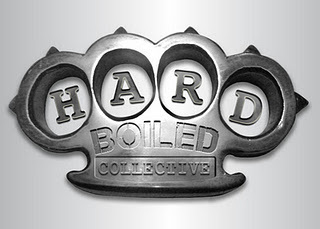
Published on February 11, 2013 22:34
February 10, 2013
AUTHOR BOBBY NASH JOINS THE FIGHT CARD TEAM!

 AUTHOR BOBBY NASH JOINS THE FIGHT CARD TEAM!
AUTHOR BOBBY NASH JOINS THE FIGHT CARD TEAM!Fight Card Publishing is excited to announce celebrated New Pulp author Bobby Nash has joined the line-up of top-notch Fight Card authors. Bobby tells us, “I’ve been very impressed with the Fight Card books created and edited by Paul Bishop and Mel Odom, and am honored to join the ranks of talented storytellers who are producing some of the best fight fiction ever.”
From his secret lair in the wilds of Bethlehem, Georgia, Bobby Nash writes a little bit of everything including novels (Evil Ways; Deadly Games!; Earthstrike Agenda), comic books (Fuzzy Bunnies From Hell; Demonslayer; Domino Lady vs. The Mummy; Lance Star: Sky Ranger “One Shot”), short prose (A Fistful of Legends; Tales of The Rook; Zombies vs. Robots), novellas (The Ruby Files; Lance Star: Sky Ranger; Blackthorn: Thunder on Mars; The New Adventures of The Eagle), graphic novels (Yin Yang; I Am Googol: The Great Invasion; Bloody Olde Englund), screenplays (Zenoids: “Animal Crackers”, Starship Farragut: “Conspiracy of Innocence”), media tie-ins (Yours Truly, Johnny Dollar; Green Hornet Case Files; Green Hornet Still at Large; Nightbeat; Honey West), and even a little pulp fiction (Domino Lady; Secret Agent X; The Avenger; The Spider) just for good measure. And he sleeps at least once a week, whether he needs it or not.
Between deadlines, Bobby is a part-time extra in movies and television. He is also the co-host of the Earth Station One and Earth Station Who podcasts (www.esopodcast.com), and writes for the All Pulp (http://allpulp.blogspot.com/) news site. Bobby is a member of the International Association of Media Tie-in Writers.
Coming in late 2013. Nash’s novel, Fight Card: Barefoot Bones, will tell the story of fighter known as Barefoot Bones due to his less than stellar beginnings in the deep south where he learned to fight out of necessity. Then came a fateful encounter with Father Tim at St. Vincent's Asylum For Boys in Chicago where he was taught the sweet science of boxing. But it’s a long way from St. Vincent’s to a battlefield in Korea where the stakes have never been higher. The one constant in Bones’ life has been fighting. Lucky for him, he’s good at it.
For more information on Bobby Nash please visit him at www.bobbynash.com, www.facebook.com/AuthorBobbyNash, www.twitter.com/bobbynash, www.lance-star.com, and http://BEN-Books.blogspot.com/among other places across the web.
Published on February 10, 2013 15:17
HONEY WEST AND T.H.E. CAT!
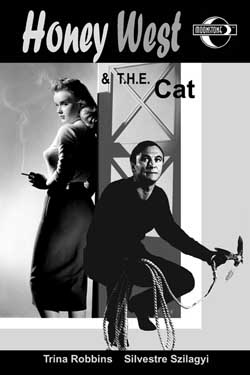 HONEY WEST AND T.H.E. CAT!
HONEY WEST AND T.H.E. CAT!COMING IN JUNE FROM MOONSTONE BOOKS!
Two cult TV icons heat it up together for the first time!
Ex-cat burglar and aerialist Thomas Hewitt Edward Cat is back for the first time in 45 years! He puts his skills to good use as a professional bodyguard. He is a man in love with danger!
Now he teams up with TV’s first lead-female private eye.
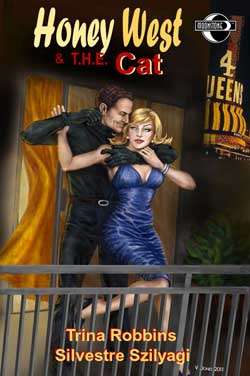 In Death in the Desert, Honey West and T.H.E. Cat find themselves in 1960's mob infested Las Vegas, when they investigate a series of accidents, but will the attraction between the two cause the case to overheat?
In Death in the Desert, Honey West and T.H.E. Cat find themselves in 1960's mob infested Las Vegas, when they investigate a series of accidents, but will the attraction between the two cause the case to overheat?32 PAGES / FULL COLOR / $3.99
Published on February 10, 2013 14:23
February 4, 2013
COMING NEXT WEEK!
 COMING NEXT WEEK!
COMING NEXT WEEK!FIGHT CARD: AGAINST THE ROPES
New York City - 1925
The boxing ring was the only world Terry Quinn had ever known. He'd entered the hallowed halls of St. Vincent’s Home for Boys in New York City as a fighter and left as a boxer. Years of training and honing his skills finally paid off as he fought his way to the top. Only one more fight stood between Quinn and shot at the heavyweight championship against Jack Dempsey. It was the glory he'd been waiting for all his life.
But things have never gone easy for Terry Quinn. As he starts training for the biggest fight of his career, a crew of Tammany thugs and fix-it men tell him to throw the fight or face dire consequences. Even before he has a chance to consider their offer, those dire consequences come home to roost when one of his long time corner men turns up dead.
The identity of the killer isn't in question. The only question is what is Terry Quinn going to do about it.
Against The Ropes is a tough New York tale played out against the Roaring Twenties as they roared their loudest. Crooked cops, Tammany hacks, has-beens, and even the great Jack Johnson, all play a role in Quinn’s decision – is his quest for justice worth his future, and possibly ... his life.
Published on February 04, 2013 21:01
January 31, 2013
ESPIONAGE CORNER: BARRACUDA!
 ESPIONAGE CORNER: BARRACUDA!
ESPIONAGE CORNER: BARRACUDA!ALTERNATING WITH JOHNNY NERO IN THE FLEETWAY SUPER LIBRARY SECRET AGENT SERIES WAS A CHARACTER KNOWN AS BARRACCUDA ... CIRCA 1967 – 1968 ...



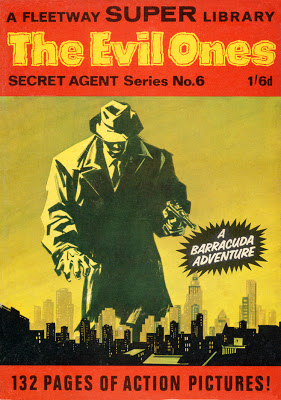
Published on January 31, 2013 15:16
ESPIONAGE CORNER: MORE JOHNNY NERO COVERS!
Published on January 31, 2013 15:13
BRITISH COMICS CORNER: THE STEEL CLAW!
 BRITISH COMICS CORNER: THE STEEL CLAW!
BRITISH COMICS CORNER: THE STEEL CLAW!THE STEEL CLAW WAS ONE OF THE MOST POPULAR COMIC BOOK HEROES OF BRITISH WEEKLY ADVENTURE COMICS OF THE 1960S AND 1970S.
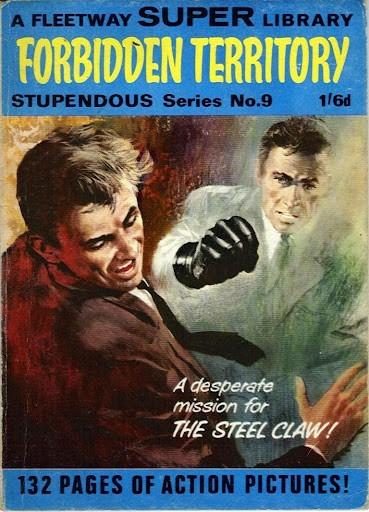 THE CHARACTER WAS REVIVED IN 2005 FOR ALBION, A SIX ISSUE MINI-SERIES PUBLISHED BY THE WILDSTORM IMPRINT OF DC COMICS.
THE CHARACTER WAS REVIVED IN 2005 FOR ALBION, A SIX ISSUE MINI-SERIES PUBLISHED BY THE WILDSTORM IMPRINT OF DC COMICS. IN 1967, FLEETWAY FEATURED THE CHARACTER IN A NUMBER OF DIGEST-SIZE ORIGINAL STORIES IN THEIR STUPENDOUS SERIES OF SUPER LIBRARY COMICS. THE STEEL CLAW WOULD ALTERNATE WITH THE SPIDER (FROM LION COMICS) IN THESE BOOKS, WITH THE CLAW FEATURING IN THE ODD-NUMBERED EDITIONS.
IN 1967, FLEETWAY FEATURED THE CHARACTER IN A NUMBER OF DIGEST-SIZE ORIGINAL STORIES IN THEIR STUPENDOUS SERIES OF SUPER LIBRARY COMICS. THE STEEL CLAW WOULD ALTERNATE WITH THE SPIDER (FROM LION COMICS) IN THESE BOOKS, WITH THE CLAW FEATURING IN THE ODD-NUMBERED EDITIONS.  BECAUSE OF THE PRESSURES OF DEADLINES, THESE MONTHLY TITLES SAW A VARIETY OF DIFFERENT WRITERS AND ARTISTS EMPLOYED, USUALLY VARIOUS ITALIAN ARTISTS, MOST NOTABLY FUTURE 2000 AD ARTIST MASSIMO BELARDINELLI. THESE RAN UNTIL JANUARY 1968.
BECAUSE OF THE PRESSURES OF DEADLINES, THESE MONTHLY TITLES SAW A VARIETY OF DIFFERENT WRITERS AND ARTISTS EMPLOYED, USUALLY VARIOUS ITALIAN ARTISTS, MOST NOTABLY FUTURE 2000 AD ARTIST MASSIMO BELARDINELLI. THESE RAN UNTIL JANUARY 1968.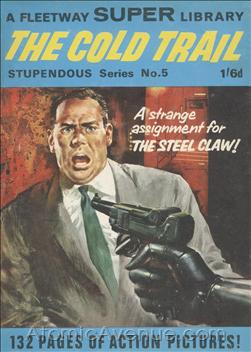
Published on January 31, 2013 15:03







